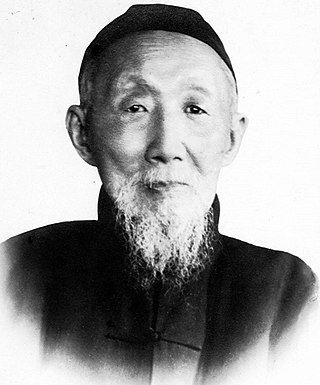Top Qs
Timeline
Chat
Perspective
Ma Xiangbo
Chinese Jesuit priest, educator, founder of several universities From Wikipedia, the free encyclopedia
Remove ads
Ma Xiangbo (traditional Chinese: 馬相伯; simplified Chinese: 马相伯; pinyin: Mǎ Xiàngbó; Wade–Giles: Ma3 Hsiang4-po2; April 7, 1840 – November 4, 1939) was a Chinese former Jesuit priest, scholar and educator in late-Qing and early-Republican China. He was one of the founders of Aurora University, Fu Jen Catholic University and Fudan University.[1][2]

Ma Xiangbo's original given name was Jianchang (建常) but was changed to Liang (良). "Xiangbo" was his courtesy name. He also adopted the Catholic name Joseph.
Remove ads
Biography
Summarize
Perspective
Ma Xiangbo was born in Dantu, Jiangsu province to a prominent Catholic family. At the age of 11, he enrolled in a French Jesuit school in Shanghai, Collège Saint-Ignace (now Xuhui High School),[3] where he remained first as student and later as teacher until 1870. In 1870, he was ordained priest in the Jesuit order.[1]
Due to the French aggressions towards China, Ma would leave the priesthood in 1876 and eventually be married and have a family. In 1886/87, he visited France and eventually devoted his life to higher education.[4] Ma founded the following institutions of higher learning:
- Aurora Academy (1903)
- Fudan Public School (1905)
- Fu Jen Catholic University (1925), in co-operation with Ying Lianzhi
His idea of establishing a highest body of learning was eventually realized in 1928 by his close friend, the educator Cai Yuanpei, who established the Academia Sinica.
Ma Xiangbo and his brother, Ma Jianzhong, also led significant political lives. Ma Jiangzhong was a prominent official in the Qing government and Ma Xiangbo served as a diplomat from 1881 to 1897 in various postings in Asia including Japan (Tokyo 1881, Yokohama 1892), Korea (1882-1885?), Europe (Britain and France 1886–1887) and the United States.[5]
Remove ads
References
Further reading
External links
Wikiwand - on
Seamless Wikipedia browsing. On steroids.
Remove ads

